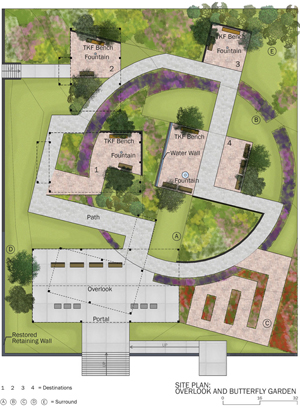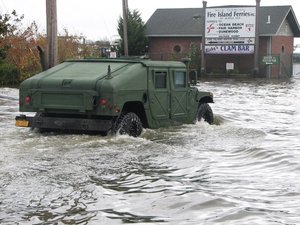"Among seven states where resident hunting participation has grown, which New York is one, 68 percent said they were interested in hunting "as a local, natural, or green food source.'' More women (55 percent vs. 27 percent) say they hunt to feed their families."
See the full article here: Do It: Wild game, it's what's for dinner
Sunday, December 8, 2013
Sunday, November 17, 2013
Tuesday, November 12, 2013
Creation of the Landscapes of Resilience Joplin Butterfly Garden video
http://www.youtube.com/v/RQHUl4gI0ts?version=3&autohide=1&showinfo=1&autohide=1&autoplay=1&feature=share&attribution_tag=cRn30cW7UzaIVcR_sd2_PQ
Saturday, November 2, 2013
Urgent Biophilia, Kairotic Time, and Sacred Space – Andrew Zolli
An interesting synthesis of my work on Urgent Biophilia and the work of my colleagues from writer Andrew Zolli, author of the book Resilience: Why Things Bounce Back.
See Urgent Biophilia, Kairotic Time, and Sacred Space – Andrew Zolli
See Urgent Biophilia, Kairotic Time, and Sacred Space – Andrew Zolli
Friday, November 1, 2013
Governor Cuomo Announces New Academic Partnership Focused on Storm Resilience and Emergency Preparedness | Governor Andrew M. Cuomo
NY EDEN and Keith Tidball of the Department of Natural Resources will play a significant role in this.
Governor Cuomo Announces New Academic Partnership Focused on Storm Resilience and Emergency Preparedness | Governor Andrew M. Cuomo
Governor Cuomo Announces New Academic Partnership Focused on Storm Resilience and Emergency Preparedness | Governor Andrew M. Cuomo
Monday, October 28, 2013
Growing Trees Together: After the Joplin Tornado
Here is a great piece by my friend and colleague Ric Mayer underscoring the importance of urban forestry after a disaster.
Growing Trees Togetherwww.isa-arbor.com/events/conference/proceedings/2013/MAYER_Sprouting a Community Recovery Forest.pdf
Growing Trees Togetherwww.isa-arbor.com/events/conference/proceedings/2013/MAYER_Sprouting a Community Recovery Forest.pdf
Tuesday, October 1, 2013
Thursday, September 26, 2013
Outdoor Recreation, Restoration and Healing for Returning Combatants
Here is a piece written for the science blog Nature of Cities: Outdoor Recreation, Restoration and Healing for Returning Combatants
Tuesday, September 3, 2013
Green Spaces: A Path to Recovery and Resilience -- CARDI Research & Policy Brief Series
Access to green space and the act of creating green spaces is well understood to promote human health, especially in therapeutic contexts among individuals suffering traumatic events. Less well understood, though currently being studied, is the role of access to green space and the act of creating and caring for it in promoting neighborhood health and well being as related to social-ecological system resilience. An important implication of this work lies in specific instances of greening and the presence of greened spaces in promoting and enhancing recovery, and perhaps resilience, in social ecological systems disrupted or perturbed by violent conflict or other catastrophic disaster. Despite the well documented importance of "interaction with nature" in post-traumatic stress management, examples of community based natural resource management are often overlooked in the hazard and vulnerability context.
Monday, September 2, 2013
Project aims to lure locavores to the wild side | Cornell Chronicle
Here is a nice update on the "Leveraging the Locavore" project:
Project aims to lure locavores to the wild side | Cornell Chronicle
Project aims to lure locavores to the wild side | Cornell Chronicle
Thursday, August 15, 2013
Monday, July 8, 2013
Climate change and NY EDEN presented at Northeast Joint Summer Session Ithaca, NY
Tidball presented a talk outlining new developments and innovations within the NY Extension Disaster Education Network (EDEN) and program area, especially dealing with climate change and the agriculture & natural resources sectors. A news media piece reported on this and the meeting.
See below for the presentation:
Tuesday, June 11, 2013
Wednesday, May 22, 2013
Tuesday, April 30, 2013
Superstorm Sandy Animal & Agriculture Response: Lessons Learned for Improved Planning
Cornell University CCE NY EDEN recently participated in the national Superstorm Sandy Animal and Agriculture Response: Lessons Learned for Improved Planning webinar. You can find the finalized report online at: http:www.eden.lsu.edu/s-cap/virtualforum. The webinar is archived online and accessible at:
http://www.eden.lsu.edu/s-cap/virtualforum If you have any questions, feel free to contact Andrea Higdon, andrea.higdon@uky.edu or Chelsey Pickens, chelsey.pickens@uky.edu.
Friday, April 26, 2013
Mechanisms of Resilience & Other ‘Re-Words’ in Urban Greening
A new blog post on The Nature of Cities blog... Mechanisms of Resilience and; Other ‘Re-Words’ in Urban Greening
Tuesday, April 2, 2013
Nature and Green Spaces: Sources, Sites, and Systems of Resilience ...
I recently presented Nature and Green Spaces: Sources, Sites, and Systems of Resilience ... at the Horticultural Society of New York's annual Healing Nature Forum: Planting the Seeds of Health and Sustainability (formerly The Horticultural Therapy Forum). Have a look, and feel free to share!
Thursday, March 7, 2013
Keynote address at the Horticulture Society of New York's Healing Nature Forum
The Horticultural Society of New York in partnership with NYU Langone Center’s Horticultural Therapy Department present:
Healing Nature Forum:
Planting the Seeds of Health and Sustainability
Formerly The Horticultural Therapy ForumThe connection to nature is essential to human health and well-being. Interacting with nature promotes physical, psychological, and community benefits. This year’s forum will focus on information that integrates programming, policy-making and fundraising with non-profits, social services, healthcare industry, and community groups. Therapeutic horticulture can improve the body, mind and spirit through passive or active involvement. Join us as we discuss the importance of horticulture as therapy.
Friday, March 29, 2013
LOCATION: |  |
Forum Agenda
| 9:00 – 9:45 | Meet & Greet Breakfast | |
| 10:00 – 11:00 | Introductions & Keynote Speaker Keynote Speaker: Keith G. Tidball, Ph.D., Senior Extension Associate, Department of Natural Resources, Cornell University. | |
| 11:00 – 12:30 | Panel Discussion: Starting Horticultural Programs in Human Service Organizations | |
| 12:30 – 1:00 | Lunch | |
| 1:15 - 2:45 | Panel Discussion: Funding Horticultural Programs in Human Services Organizations | |
| 2:45 – 3:00 | Closing Remarks |

Wednesday, March 6, 2013
URBIS- Urban Biosphere Initiative presented at Atkinson Center for a Sustainable Future
Tidball and colleagues recently summarized the results of the funding they received from the Atkinson Center for a Sustainable Future (ACSF) at a topical lunch. The focus was on recent work on urban sustainability and biodiversity conservation that was presented, discussed and launched at Rio +20 in June of 2012. The goal of this ACSF funded work has been to develop an inter-disciplinary research program focusing on sustainability, biodiversity, social-ecological systems resilience, and ecosystem services in cities. Recognizing that cities are now the dominant human habitat, the project has endeavored to address a gap left by other global sustainability initiatives, such as the Millennium Ecosystem Assessment, which pay only minimal attention to urban ecosystems. This applied research and work at the science-to-policy interface has contributed significantly to the launch of the URBIS global urban biosphere policy initiative, which has been endorsed by several international agreements and was launched at the Rio +20 UN Conference on Sustainable Development. Click here for the full report.
Monday, February 25, 2013
CC NY EDEN mentioned in EZRA magazine
In the latest issue of EZRA magazine (page 9), NY CCE EDEN was mentioned:
“A recent example of CCE’s responsiveness: Within hours of Hurricane Sandy this fall, it made resources available to victims of the storm. Its New York Extension Disaster Education Network (NY EDEN), eden.cce.cornell.edu, provided farmers, businesses and communities affected by the hurricane with education on hazardous materials, food safety, diseases and best-practice guides on dealing with
long term power outages and agricultural strategies for recovery for growers. NY EDEN also placed extension educators on disaster management and recovery teams.”
VOL. V NO. 2, WINTER 2013, pg 9.
Wednesday, February 6, 2013
NY EDEN Connecting CCE Associations, Campus, and Communities
This morning the CCE NY Extension Disaster Education Network (EDEN) advisory committee presented a webinar dealing with the important topic of how NY EDEN can play a large role in connecting CCE Associations, Campus, and Communities.
To experience a recording of the webinar, please navigate here.
To experience a recording of the webinar, please navigate here.
Monday, February 4, 2013
Saturday, February 2, 2013
Testimony before NY Legislature re NY EDEN and Superstorm Sandy
Tidball presented testimony on the NY Extension Disaster Education Network before the New York Legislature Standing Committee on Environmental Conservation’s Hearing on Effects of Extreme Weather Events, in Babylon, Long Island, New York on January 30th, 2013. The written testimony can be accessed here.
Friday, January 18, 2013
Extension Disaster Education Policy Recommendations Forwarded to Decision Makers at National Conference in Washington
At the National Council on Science and the Environment (NCSE) 2013 National Conference titled Disasters And Environment: Science, Preparedness, And Resilience, members of the national Extension Disaster Education Network gathered to discuss and submit recommendations to Congress, the White House, and other federal and state government entities on building community resilience through extension programs.
Tidball represented NY EDEN and joined National EDEN Chair Rick Atterberry, National EDEN Homeland Security project leader Steve Cain, National EDEN web manager Pat Skinner, and National EDEN immediate past chair Virginia Morgan White at the symposium, along with many other participants. Recommendations will be released shortly and published by NCSE.
The Disasters and Environment Conference addressed the increasing occurrence of environmental disasters and the science, technology, and decision-making needed to more effectively prepare, respond, and make our communities more resilient. The conference engaged more than 1,200 leaders from emergency response, scientific, policy, conservation, and business communities, as well as federal and local government officials, who will work across traditional boundaries to develop strategies and launch new partnerships and initiatives.
The Disasters and Environment Conference addressed the increasing occurrence of environmental disasters and the science, technology, and decision-making needed to more effectively prepare, respond, and make our communities more resilient. The conference engaged more than 1,200 leaders from emergency response, scientific, policy, conservation, and business communities, as well as federal and local government officials, who will work across traditional boundaries to develop strategies and launch new partnerships and initiatives.
Subscribe to:
Posts (Atom)












